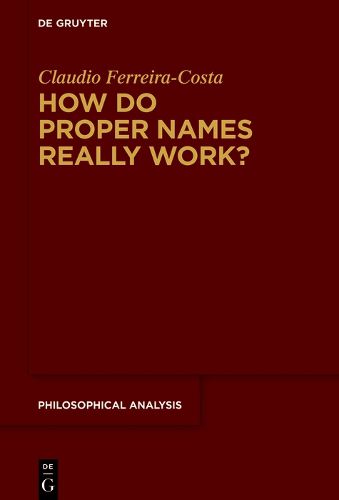Readings Newsletter
Become a Readings Member to make your shopping experience even easier.
Sign in or sign up for free!
You’re not far away from qualifying for FREE standard shipping within Australia
You’ve qualified for FREE standard shipping within Australia
The cart is loading…






For fifty years the philosophy of language has been experiencing a stalemating conflict between the old descriptive and internalist orthodoxy (advocated by philosophers such as Frege, Russell, Wittgenstein, Strawson, and Searle) and the new causal-referential and externalist orthodoxy (mainly endorsed by Kripke, Putnam, and Kaplan). Although the latter is dominant among specialists, the former retains a discomforting intuitive plausibility. The ultimate goal of this book is to overcome the stalemate by means of a non-naive return to the old descriptivist-internalist orthodoxy. Concerning proper names, this means introducing second-order description-rules capable of systemizing descriptions of the proper name's cluster to provide us with the right changeable conditions of satisfaction for its application. Such rules can explain how a proper name can become a rigid designator while remaining descriptive, disarming Kripke's and Donnellan's main objections. In the last chapter, this new perspective is extended to indexicals in a discussion of David Kaplan's and John Perry's views, and of general terms, in a discussion of Hilary Putnam's externalism.
$9.00 standard shipping within Australia
FREE standard shipping within Australia for orders over $100.00
Express & International shipping calculated at checkout
For fifty years the philosophy of language has been experiencing a stalemating conflict between the old descriptive and internalist orthodoxy (advocated by philosophers such as Frege, Russell, Wittgenstein, Strawson, and Searle) and the new causal-referential and externalist orthodoxy (mainly endorsed by Kripke, Putnam, and Kaplan). Although the latter is dominant among specialists, the former retains a discomforting intuitive plausibility. The ultimate goal of this book is to overcome the stalemate by means of a non-naive return to the old descriptivist-internalist orthodoxy. Concerning proper names, this means introducing second-order description-rules capable of systemizing descriptions of the proper name's cluster to provide us with the right changeable conditions of satisfaction for its application. Such rules can explain how a proper name can become a rigid designator while remaining descriptive, disarming Kripke's and Donnellan's main objections. In the last chapter, this new perspective is extended to indexicals in a discussion of David Kaplan's and John Perry's views, and of general terms, in a discussion of Hilary Putnam's externalism.